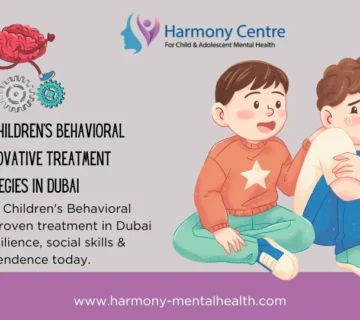Feeding Disorders Early Intervention Dubai: Proactive Strategies for Better Nutrition and Growth at Harmony Centre
Learn how early intervention for feeding disorders in Dubai at Harmony Centre improves nutritional intake and promotes long‑term growth. Discover effective treatment strategies.
Introduction
In Dubai’s fast‑paced environment, early intervention is key to addressing feeding disorders in children. At Harmony Centre Mental Health Dubai, we understand that timely, personalized care can prevent nutritional deficiencies and support overall development. Our multidisciplinary team uses evidence‑based strategies to detect and treat feeding disorders early, ensuring children receive the nutrients they need for optimal growth and well‑being.
Learn More About Harmony Centre • Contact Us
Understanding Feeding Disorders
What Are Feeding Disorders?
Feeding disorders refer to difficulties with eating and nutrition that can affect a child’s growth, health, and development. These disorders often manifest as a refusal to eat a variety of foods, extreme selectivity, or disruptive mealtime behaviors. They may stem from sensory sensitivities, developmental delays, or behavioral issues that interfere with proper nutrition.
- Limited Food Repertoire: Children may only consume a narrow range of foods, which can lead to imbalances in essential nutrients.
- Behavioral Challenges: Mealtime can become a stressful experience marked by tantrums, anxiety, or resistance to trying new foods.
- Sensory Sensitivities: Some children may be overly sensitive to textures, smells, or the appearance of food, which can cause them to avoid certain items.
The Impact on Nutrition and Development
Feeding disorders can have significant consequences if left unaddressed:
- Nutritional Deficiencies: A limited diet can result in insufficient intake of vitamins and minerals necessary for growth.
- Delayed Development: Inadequate nutrition may affect cognitive, physical, and emotional development.
- Family Stress: Mealtime struggles can create stress within the family, impacting overall dynamics and quality of life.
The Importance of Early Intervention
Why Early Detection Matters
Early intervention is critical in mitigating the long‑term effects of feeding disorders. Identifying these challenges at a young age allows for prompt, targeted strategies that can improve nutritional intake and overall development.
- Preventing Nutritional Deficiencies: Early treatment helps ensure children receive a balanced diet, supporting growth and immune function.
- Improved Developmental Outcomes: Timely intervention can promote better cognitive and physical development, reducing delays and associated challenges.
- Reducing Family Stress: Early support and guidance help create a more positive mealtime environment, easing tensions and improving family dynamics.
- Long‑Term Resilience: Early strategies lay the foundation for healthy eating habits and coping skills that benefit children throughout life.
The Role of Professionals and Caregivers
Both healthcare professionals and families play essential roles in early intervention:
- Multidisciplinary Assessments: Comprehensive evaluations by specialists help pinpoint the specific issues affecting feeding.
- Collaborative Treatment Planning: Involving parents, educators, and therapists ensures that interventions are consistent across home, school, and clinical settings.
- Ongoing Monitoring: Regular follow‑up allows for adjustments in treatment strategies, ensuring that progress is maintained over time.
Our Approach at Harmony Centre
Comprehensive Assessments for Feeding Disorders
At Harmony Centre, our feeding assessments are designed to provide a thorough understanding of each child’s nutritional and behavioral challenges. Our process includes:
Initial Consultation
- Family History and Concerns:
We begin by gathering detailed information about your child’s feeding habits, allergies, and previous issues. - Medical and Developmental Reviews:
Relevant records, such as growth charts and previous assessments, are reviewed to form a baseline. - Parental Observations:
Parents share insights into mealtime behaviors and specific challenges encountered at home.
Standardized Nutritional Evaluations
- Food Diaries and Questionnaires:
Parents are asked to record meals and snacks over a period to provide quantitative data on food intake. - Growth Measurements:
Regular tracking of height, weight, and BMI offers objective data on physical development. - Behavioral Observations:
Our therapists observe your child during meals in both structured and natural settings to identify behavioral patterns.
Learn More About Our Assessment Process
Multidisciplinary Team Review
Our multidisciplinary team, including nutritionists, occupational therapists, speech therapists, and child psychologists, collaborates to analyze all assessment data. This team review ensures that every aspect of your child’s feeding disorder is understood.
- Interdisciplinary Meetings:
Specialists discuss test results, observations, and parental feedback to develop a comprehensive diagnostic profile. - Diagnostic Profile Creation:
We outline your child’s strengths, challenges, and areas needing intervention. - Goal Setting:
Clear, measurable goals are established to guide the development of a personalized treatment plan.
Personalized Feeding Intervention Plans
Based on our comprehensive assessments, we design tailored intervention plans to address your child’s specific needs.
Individualized Nutritional Guidance
- Customized Meal Plans:
Nutritionists develop balanced meal plans that provide essential nutrients while respecting your child’s food preferences and sensory sensitivities. - Gradual Food Introduction:
New foods are introduced slowly alongside familiar items to increase acceptance. - Creative Food Presentation:
We use visual and creative techniques to make meals appealing and engaging.
Behavioral and Sensory Integration Strategies
- Positive Reinforcement Techniques:
Reward systems are implemented to encourage trying new foods and maintaining healthy eating habits. - Sensory Integration Activities:
Occupational therapy exercises help your child adjust to different textures, smells, and appearances of food. - Play-Based Interventions:
Incorporating play into mealtime can reduce anxiety and create positive associations with eating.
Family-Centered Support
- Parental Workshops:
Our workshops provide parents with practical strategies and techniques to support feeding interventions at home. - Home Practice Programs:
Tailored exercises and activities are provided for parents to implement between therapy sessions. - Regular Follow‑Up:
Continuous monitoring ensures that progress is tracked and adjustments are made as needed.
Evidence-Based Outcomes and Success Stories
Quantitative Improvements
Our evidence-based approach has led to significant measurable improvements:
- Improved Nutritional Intake:
Children show increased consumption of a wider variety of foods. - Enhanced Growth Metrics:
Regular tracking reveals positive changes in height, weight, and overall health. - Reduced Mealtime Conflicts:
Behavioral improvements lead to more relaxed and enjoyable meals.
Real-Life Success Stories
“After a detailed feeding assessment at Harmony Centre, we learned effective strategies to expand our son’s diet. His nutritional intake has improved dramatically, and our mealtimes are now stress-free.”
– Parent Testimonial
“The personalized feeding plan and gradual food introduction techniques transformed my daughter’s eating habits. Her growth and energy levels have improved noticeably.”
– Parent Testimonial
For additional information on child nutrition, refer to the Academy of Nutrition and Dietetics (external link).
Practical Strategies for Families and Educators
For Families
Create a Structured Mealtime Environment
- Establish Consistent Schedules:
Use visual aids to set regular meal and snack times. - Designate a Calm Eating Area:
Create a distraction-free space that promotes focused eating. - Engage in Family Meals:
Sharing meals together reinforces healthy eating habits and provides a supportive atmosphere.
Introduce Foods Gradually
- Start Small:
Introduce new foods in small portions alongside familiar favorites. - Creative Presentation:
Make meals visually appealing to stimulate interest. - Encourage Involvement:
Involve your child in meal planning and preparation to increase engagement.
Utilize Digital Tools
- Telehealth Consultations:
Schedule virtual sessions with our nutrition experts for continuous support. - Educational Apps:
Use apps that provide interactive meal planning and nutritional guidance.
For Educators
Integrate Nutrition Education in the Classroom
- Interactive Lessons:
Teach students about balanced diets and the importance of diverse nutrients. - Group Projects:
Organize activities that involve planning and preparing healthy meals. - Collaboration:
Work with parents and health professionals to ensure consistency in nutrition education.
Monitor and Support Students
- Regular Feedback:
Keep track of students’ eating habits and provide constructive feedback. - Create a Supportive Environment:
Encourage positive mealtime behaviors and social interactions among students.
For the Community
Engage in Local Nutrition Workshops
- Attend Seminars:
Participate in community events focused on child nutrition and healthy eating. - Join Support Groups:
Connect with other parents to share experiences and strategies. - Advocate for Healthy Food Access:
Support local initiatives that promote access to nutritious foods in schools and community centers.
Explore Our Community Initiatives • Contact Harmony Centre
Frequently Asked Questions about Feeding Disorders Early Intervention Dubai
Book a Consultation Now
Contact Information
Office Address:
Office 409, Building Alrazi-64C, 26th St, Umm Hurair 2, Dubai Healthcare City, Dubai
Phone:
+971 4 558 2015
+971 5 287 73268
Email:
info@harmony-mentalhealth.com
Final Thoughts about Feeding Disorders Early Intervention Dubai
Feeding assessments are a crucial step in addressing and preventing nutritional challenges in children. At Harmony Centre Mental Health Dubai, our comprehensive, evidence‑based evaluations lay the foundation for personalized feeding interventions that promote healthy eating habits, support growth, and enhance overall well‑being. By integrating nutritional guidance, behavioral strategies, and family-centered care, we empower families to overcome feeding difficulties and ensure that every child receives the nourishment they need to thrive.
Invest in your child’s future with expert feeding assessments and tailored interventions from Harmony Centre. Our commitment to early intervention and continuous support makes us the trusted partner in promoting optimal child nutrition in Dubai.
Learn More About Harmony Centre
Get in Touch
👉 Book a Consultation Now: Call +971 4 558 2015 or visit www.harmony-mentalhealth.com.
Join our online community and stay updated with our latest events, articles about Feeding Disorders Early Intervention Dubai



